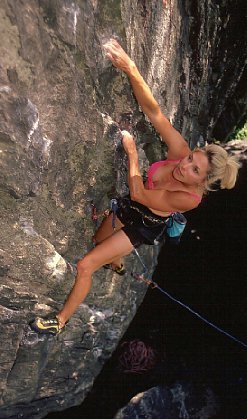Building "Mental Muscle"
 The late, great Wolfgang Güllich was fond of saying that "the brain is the most important muscle for climbing." What makes this statement even more provocative is the fact that Güllich was one of the strongest to ever pull down on stone. Anyway, I agree completely with Wolfie's sentiment that a serious climber must be equally serious about mental training.
The late, great Wolfgang Güllich was fond of saying that "the brain is the most important muscle for climbing." What makes this statement even more provocative is the fact that Güllich was one of the strongest to ever pull down on stone. Anyway, I agree completely with Wolfie's sentiment that a serious climber must be equally serious about mental training. Consider that everything you are and will become is a direct function of your thoughts. Thoughts are precursors to almost every significant action you make, including most climbing moves and all training exercises. Given this perspective, what could be more central to improving performance than fostering curious, proactive, and goal-directed thoughts that will direct high quality actions?
Beginning today, strive to regularly tune into your thoughts and emotions. It's also important to develop higher awareness of how your body reacts to the mental "ups" and "downs." Given this heighten awareness, you can proactively optimize your mental and physical state. For instance, when you recognize negative, fearful thinking, you can immediately supplant such thoughts with positive imagery and productive self-talk. Or, when you identify growing physical tension you can engage in slow, deep breathing and redirect your thinking to a calming topic.
The impact of improving the quality of your thinking can't be overstated both in terms of immediate results and long-term improvement. The goal is to modify your thinking in ways that will help you solve problems (instead of wallowing in them), challenge fears (instead of avoiding them), and compel intelligent action toward your goals (instead of backpedaling at the first sign of adversity). These very specific ways of thinking are the essence of mental toughness--a hallmark of top climbers (and peak performers) the world over, and something your should aspire to develop as well.



 Subscribe to Eric's RSS Feed
Subscribe to Eric's RSS Feed

5 Comments:
How can you foster the subconscious, reactive side of climbing? We are constantly making thousands of minute unconscious adjustments to our bodies as we move. When these sequences are wired, problems can seem effortless.
The unconscious adjustments are fostered (actually developed) as a result of delibrate practice. A novice's movements are clumsy and inefficient, but through practice they develop the schema that will yield ever increasing motor skills. As this skill set expands, they come to move with increasing efficiency and intuitiveness...and not need to think! Of course, this is the "state" (or "zone") you refer to, when movement seems effortless.
Sometimes during a very intense bouldering problem time sort of slows down and I feel focused. These are usually the problems that I send. When I feel "fuzzy-headed" I often fall. Any suggestions for keeping the attention fixed for an entire session. It isn't long before I start to think about what I am going to have for dinner or the work I have to get done the next day...
It's a complex subject with many different angles. However, you largerly answered your own question. Distractions are the enemy of focus--so if your head is "fuzzy" with stray thoughts (whether it be about work, fear, or even anticipating the outcome) it's impossible to create intense focus and "stop time." Thus, many athletes meditate or engage in relaxation strategies before they perform with the goal of quieting the mind (my book, Training for Climbing, details a "pinpoint focus" exercise that many climbers also find helpful in creating a still mind). The bottom line: your awareness (which seems acute) is the first step to optimizing your mental state. The next step is experimenting to find what mental calming technique works best for you on days you brain is on overload!
P.S. I recently recorded an interview with Chris Sharma and he provides nice detail on his pre-climb strategies. This "Masters of Rock" interview series will be available on CD next month. You'll learn more about it here.
One other aspect of the minds effect on climbing I have noticed is that actually willing yourself to do something sometimes makes it possible. For example, I used to get stuck at 15 pull-ups. As soon as I got near number 14 of my set I would suddenly feel fatigued. It wasn't until I convinced myself that I could do more that I broke that barrier. Second, sometimes in the gym or out on the rock if I don't tell myself (grip this hold as hard as you can) I will give the hold a mediocre grip and fall. Is this common? It just surprises me that I can adjust my strength output by intentional mental effort.
Post a Comment
<< Home